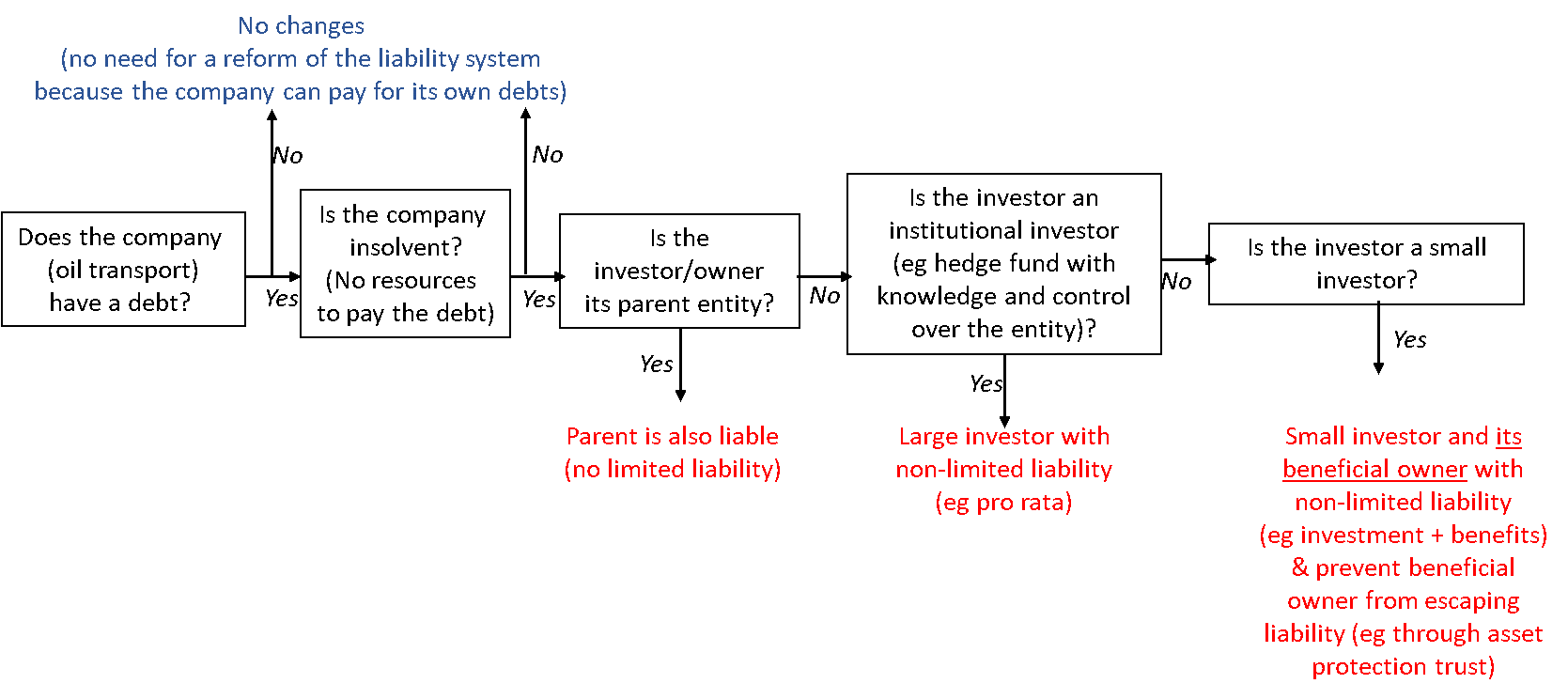
Andres Knobel ■ Rethinking Limited Liability: Beneficial Ownership Transparency to Reform the Liability System, working paper

I am sharing a working paper which I, Andres Knobel have written, for which I welcome feedback, please send to [email protected]. Here’s a summary below, and you can read the full paper here.
Rethinking Limited Liability: Beneficial Ownership Transparency to Reform the Liability System
Limited liability refers to the right to cap a legal or natural person’s losses up to their investment in a legal vehicle, shielding the rest of their personal wealth from the entity’s debts. Limited liability is two-sided: i) the personal creditors of a shareholder in a limited liability company have no direct right over the company’s assets (they can seize the shareholder’s shares, but they can’t reach into the company to seize its equipment etc.), while ii) the creditors of the company cannot access the shareholder’s personal assets. Limited liability is usually obtained simply by creating or incorporating a legal vehicle as a separate entity. It may also be achieved where the law recognises a distinct pool of assets without separate legal personality. This could be, for example, a trust where the law distinguishes the trustee’s personal assets from the assets held by the trustee in relation to the trust.
The main problem of limited liability, from a justice perspective, is that it caps investors’ losses but not their gains, transferring the risk and costs of any endeavour to the rest of society, but not sharing any of the profits.
In addition, limited liability is one of the benefits automatically obtained by legal vehicles when they are incorporated (eg companies) or created (eg trusts) without requiring that legal vehicle to offer society anything in return. Vehiclesenjoying limited liability do not even offer transparency about who is benefitting from the vehicle, unless their country of incorporation has a public beneficial ownership registry. In other words, while limited liability was presented in theory as an incentive for investors to undertake risks which would create employment and economic growth, nothing in the law requires this social benefit to take place. An individual could set up a company to hold their assets (eg house, car, yacht) and such a company would enjoy limited liability even though it creates no benefit for society.
Finally, limited liability is an argument used to justify the need for complexity within corporate structures. When corporate groups create complex structures involving many layers of entities, they can not only create secrecy (because it becomes harder to identify who is ultimately owning or controlling the group), but they also add layers of limited liability to isolate risks from the rest of the group, protecting the corporate group but affecting society at large.
This brief explains why the current system of limited liability is unfair, and it proposes ways to rethink limited liability to make it more aligned with goals of financial justice and equality. This brief proposes that if an entity’s assets are not enough to pay for its debts, then the entity’s owners should need to respond, at least partially, with their personal wealth.
To enforce this new system, more transparency would be required to ensure the identity of each owner (shareholder or investor) in an entity is easily accessible. Beneficial ownership transparency deals precisely with the identification of the natural persons who ultimately and effectively own, control, or benefit from legal companies and other legal vehicles. Therefore, beneficial ownership transparency is an essential tool to have a fairer liability system.
In addition to knowing the identity of each owner, it is necessary to ensure that they won’t be able to protect their personal wealth by transferring it to yet another entity. This proposal to prevent individuals from escaping liability by shielding their assets should not just apply to owners of entities, but to any individual who is liable to a creditor (eg because they ran over someone with a car).
Conclusion and proposals:
Although limited liability is invoked as a tool to promote economic growth, this paper explains that limited liability has evolved such that it is automatically awarded upon the creation of a legal vehicle, often in situations where it was never meant to apply (eg between a parent and its subsidiary). In addition, this paper describes the unfairness of a system which caps losses but not gains, by transferring the losses to the rest of society. From a financial justice perspective, the system of liability should be completely reformed. For reforms to be effective, however, it is necessary to hold the beneficial owner liable and to prevent them from shielding their assets through the creation of trusts or private interest foundations.
Although the issue of reforming limited liability deserves much more research and development, this brief explains why the current situation is unfair and proposes alternatives which would improve the situation.
In summary, this paper proposes to consider and further develop measures to:
- End limited liability between a subsidiary and its parent.
- End limited liability for investors who are especially wealthy and have considerable information and control over an entity (especially large investment funds).
- For natural person small ultimate investors, alternatives to limited liability should at least be considered. Alternatives include pro rata liability, or bringing all of the benefits received to the liability pool including dividends and capital gains (rather than just the original investment).
- Liability should be held by the beneficial owner (to prevent the ultimate investor from escaping liability or being unidentified, including by recourse of a complex ownership chain to hold the shareholdings).
- To prevent the beneficial owner from shielding assets from creditors (to escape liability), asset protection trusts or private interest foundations should be disregarded by considering that the settlor or founder is still the owner of the trust/foundation assets until they have been distributed to the beneficiaries.
- If all of the above proposals are considered too radical, then limited liability should, at the very least, apply only to “active” entities that engage in business, hire employees, and undertake risks (thus creating some benefit for society at large). It should not apply to “passive” or holding entities which merely hold assets but do not engage in any type of risk or value creation
Decision tree on the application of non-limited liability:

You can read the full paper here.
Related articles
UN submission: Tax justice and the financing of children’s right to education
14 July 2025

How the UN Model Tax Treaty shapes the UN Tax Convention behind the scenes
The 2025 update of the UN Model Tax Convention
9 July 2025
One-page policy briefs: ABC policy reforms and human rights in the UN tax convention
Tax justice pays dividends – fair corporate taxation grows jobs, shrinks inequality

Reclaiming tax sovereignty to transform global climate finance

The “millionaire exodus” visualised
The millionaire exodus myth
10 June 2025

The Financial Secrecy Index, a cherished tool for policy research across the globe


